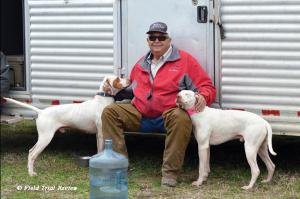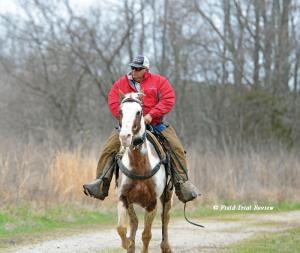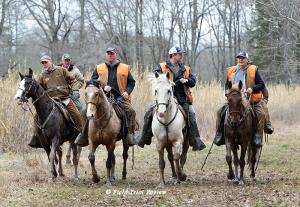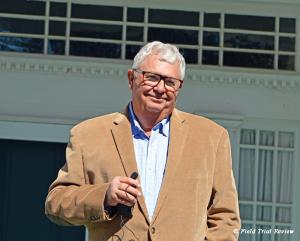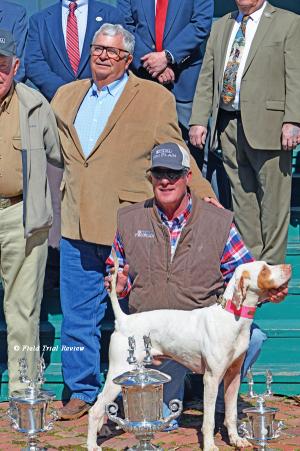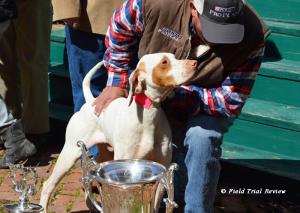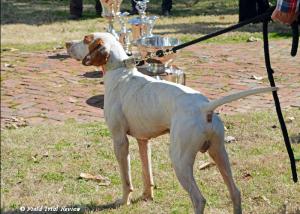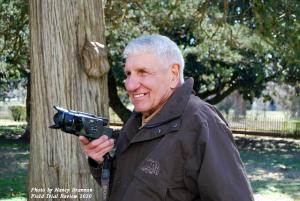By Nancy Brannon
There were 37 dogs nominated to run in the 121st National Championship, but at the drawing on Saturday February 8, 2020 the announcement was made that Lester’s Sunny Hill Jo would not be running this year because of “health reasons.” So, 36 dogs were drawn to run in the 2020 installment, beginning Monday February 10th.
Miller’s Speed Dial is the 2020 National Champion, owned and handled by Gary Lester, scouted by Mark McLean. The announcement was made around 11 a.m. on Friday, February 21, 2020 at the Ames Manor House, after a very short morning brace.
This was “Joe’s” second year running in the National Championship after putting in a commendable three-hour run last year. The four-year-old orange and white pointer male is a son of 2015 National Champion Miller’s Dialing In.
Dr. Rick Carlisle made the traditional thank-yous to all the sponsors and contributors to the National Championship, and then he announced Miller’s Speed Dial as the winner. But in an odd turn of events, Gary Lester and the dog were nowhere around. Even scout Mark McLean didn’t know where he was. Someone said they’d heard he was eating at a restaurant in Grand Junction. Carlisle got on the phone, “speed dialed” Lester, and Lester made his arrival at the Manor House fairly soon thereafter.
Lester had a few remarks to make on the green steps of the Manor House, his favorite place in the world to be this time of year, he said. “We’ve been very fortunate; we’ve been very blessed. God has been real good to us. This is a time when I’m usually happy and excited, and I am today.” But he had just lost a friend and fellow handler, Robin Gates. “And it’s hard to celebrate when you know Robin’s family is hurting so bad.” Lester concluded his remarks with a prayer for the Gates’ family. Then it was time for the photo session.
Interviewed afterward by Larry Rea, Lester talked about his plans for running Joe in the National. The week before his run, Lester’s plan was to have Joe hunting every step of the way and pointing a lot of birds. But seeing how muddy the fields were and how rough the going was, he decided to revise his plan. “I talked to Ferrell [Miller] about it and decided to change my plan.” He had gone to Mr. Smith’s plantation and worked Joe about an hour and 20 minutes on Saturday. Then he decided to let him rest the best part of the week preceding his run at Ames.
On Tuesday in the 13th brace, Lester said, “We turned him loose and let him go. Once we got him to the front, he did everything I asked him to do.” Lester mimicked hearing the judges’ call when the dog successfully pointed birds. “After hearing it a couple of times,” Lester said, “I started getting excited!” He talked easy to his dog, he said. “And I didn’t look back at the judges; I just looked straight ahead” and kept on moving. “The mud was really bad, but he looked like a million dollars on every find. That’s a Miller-bred dog. He’s tough.”
Lester had major back surgery last October and, at times, it seemed questionable whether he would be able to handle a dog at the National Championship. But he and Mark had worked the dog in south Georgia over the winter, and Lester said he feels better now than he has in years.
“I’m very blessed!” Lester often says, and he thanks God for all the opportunities he’s been given.
He praised Mr. Ferrell, his mentor, “who taught me everything. Ferrell once told me that a dog who wins a championship must look like a champion.” Lester definitely agrees that Joe looks like a champion.
He also praised his relationship with scout Mark McLean. “I’m 100% better handler when Mark’s my scout.” He explained how well their partnership allows one to anticipate what the other will do and to work together seamlessly. “We’ve figured each other out,” he said. “We’ve probably spent more days together than I have with my wife!”
Lester had a lot of good things to say about Robin Gates. “He’s the best handler. He could really show off a dog and he could get the gallery excited.” In his earlier years, learning about handling bird dogs, Lester said, “I watched him like a hawk. I learned a lot from him.”
121st Running
The weekend weather preceding the National Championship was beautiful and sunny, with highs in the 50s on Saturday and in the 60s on Sunday. But by Sunday evening, the winter rain had returned to the mid-south, accompanied by some heavy downpours and thunderstorms, so rain would, once again, plague the National Championship.
In spite of all the rain, this year’s National Championship only missed one full day (Wednesday Feb. 12) to rain, and another half day to rain, pushing the last brace to the second Friday morning. There were rain delays, and a “winter weather mix” delay one morning. But generally, the field trial ran on schedule. Coldwater Thunder, was scratched from his brace on Wednesday afternoon Feb. 19, due to health issues.
The first solid performance came on Tuesday morning, February 11, when Dunn’s Tried N True had eight finds and finished a solid three-hour brace for handler Luke Eisenhart and owners Will and Rita Dunn. That afternoon, Dominators Rebel Heir put on quite a performance with nine finds, finishing the three hour course for his handler Jamie Daniels and owner Jim Hamilton.
Jamie Evans wrote on the Ames Plantation facebook page: “Eighteen bird contacts today! Seventeen total finds by just two of today's competitors! A solid performance was demonstrated on both courses! The bar was raised high today by both Dunn’s Tried N True and Dominators Rebel Heir.”
Heavy rain and thunderstorms led to the cancellation of both braces on Wednesday February 12.
Another solid three-hour performance didn’t come until the next Tuesday morning, February 18, when Miller’s Speed Dial was paired with Dogwood Bill. The day saw quite a bit of rain and some thunderstorms. After an unproductive, Bill was picked up at :30 because of a health issue. That left Miller’s Speed Dial with the course to himself, where he had seven finds and finished the three hours. Here’s the official account of his run: “Speed Dial had a find at 1:09 in Low Lands; a second find at 1:27 mid-way in Locust Turn; a third find at 1:44 on the west edge of Morgan Field along the tree line. His fourth find came at 2:02 in the northern Low Lands field, and his fifth at 2:50 in the cut between Climmie Clark North and South. His sixth, and final, find was at 2:55 on the north end of Morgan at the pines. He finished the three hours.
That afternoon, Valiant, handled by Randy Anderson for owner Jay McKenzie, put in another three-hour performance, with five finds, an unproductive, a stop to flush, and a back. None of the other dogs in the competition would finish the three hours.
To the untrained field trial judge, one may wonder what it was about Joe’s performance that surpassed the other three dogs. Dr. Carlisle explained some of the nuances to judging the National Championship. “It’s not just the number of birds pointed, but the dog’s ground race that is one of the most important criteria. Rebel was at his best the first hour, but then an hour and a half lapsed until his next find. Tried N True ran a good ground race the first hour and a half, but then he went through a 30-minute sinking spell and [handler] Luke [Eisenhart] had to give him some “juice” to perk the dog back up. On some points, his tail was not up at “12 o’clock,” as it is expected to be. Valiant had a few mistakes and an unproductive. The handler went to find the dog too many times, when that was the job of the scout. In contrast, Speed Dial was always to the front, had plenty of energy, and always had his tail up. Gary let the dog hunt on his own. The handler is not supposed to hunt the dog, but is supposed to allow the dog to show how well he hunts birds on his own. Every one of Joe’s finds was a good, honest find, and the dog found birds in some unexpected places.”
There were 37 dogs nominated to run in the 121st National Championship, but at the drawing on Saturday February 8, 2020 the announcement was made that Lester’s Sunny Hill Jo would not be running this year because of “health reasons.” So, 36 dogs were drawn to run in the 2020 installment, beginning Monday February 10th.
Miller’s Speed Dial is the 2020 National Champion, owned and handled by Gary Lester, scouted by Mark McLean. The announcement was made around 11 a.m. on Friday, February 21, 2020 at the Ames Manor House, after a very short morning brace.
This was “Joe’s” second year running in the National Championship after putting in a commendable three-hour run last year. The four-year-old orange and white pointer male is a son of 2015 National Champion Miller’s Dialing In.
Dr. Rick Carlisle made the traditional thank-yous to all the sponsors and contributors to the National Championship, and then he announced Miller’s Speed Dial as the winner. But in an odd turn of events, Gary Lester and the dog were nowhere around. Even scout Mark McLean didn’t know where he was. Someone said they’d heard he was eating at a restaurant in Grand Junction. Carlisle got on the phone, “speed dialed” Lester, and Lester made his arrival at the Manor House fairly soon thereafter.
Lester had a few remarks to make on the green steps of the Manor House, his favorite place in the world to be this time of year, he said. “We’ve been very fortunate; we’ve been very blessed. God has been real good to us. This is a time when I’m usually happy and excited, and I am today.” But he had just lost a friend and fellow handler, Robin Gates. “And it’s hard to celebrate when you know Robin’s family is hurting so bad.” Lester concluded his remarks with a prayer for the Gates’ family. Then it was time for the photo session.
Interviewed afterward by Larry Rea, Lester talked about his plans for running Joe in the National. The week before his run, Lester’s plan was to have Joe hunting every step of the way and pointing a lot of birds. But seeing how muddy the fields were and how rough the going was, he decided to revise his plan. “I talked to Ferrell [Miller] about it and decided to change my plan.” He had gone to Mr. Smith’s plantation and worked Joe about an hour and 20 minutes on Saturday. Then he decided to let him rest the best part of the week preceding his run at Ames.
On Tuesday in the 13th brace, Lester said, “We turned him loose and let him go. Once we got him to the front, he did everything I asked him to do.” Lester mimicked hearing the judges’ call when the dog successfully pointed birds. “After hearing it a couple of times,” Lester said, “I started getting excited!” He talked easy to his dog, he said. “And I didn’t look back at the judges; I just looked straight ahead” and kept on moving. “The mud was really bad, but he looked like a million dollars on every find. That’s a Miller-bred dog. He’s tough.”
Lester had major back surgery last October and, at times, it seemed questionable whether he would be able to handle a dog at the National Championship. But he and Mark had worked the dog in south Georgia over the winter, and Lester said he feels better now than he has in years.
“I’m very blessed!” Lester often says, and he thanks God for all the opportunities he’s been given.
He praised Mr. Ferrell, his mentor, “who taught me everything. Ferrell once told me that a dog who wins a championship must look like a champion.” Lester definitely agrees that Joe looks like a champion.
He also praised his relationship with scout Mark McLean. “I’m 100% better handler when Mark’s my scout.” He explained how well their partnership allows one to anticipate what the other will do and to work together seamlessly. “We’ve figured each other out,” he said. “We’ve probably spent more days together than I have with my wife!”
Lester had a lot of good things to say about Robin Gates. “He’s the best handler. He could really show off a dog and he could get the gallery excited.” In his earlier years, learning about handling bird dogs, Lester said, “I watched him like a hawk. I learned a lot from him.”
121st Running
The weekend weather preceding the National Championship was beautiful and sunny, with highs in the 50s on Saturday and in the 60s on Sunday. But by Sunday evening, the winter rain had returned to the mid-south, accompanied by some heavy downpours and thunderstorms, so rain would, once again, plague the National Championship.
In spite of all the rain, this year’s National Championship only missed one full day (Wednesday Feb. 12) to rain, and another half day to rain, pushing the last brace to the second Friday morning. There were rain delays, and a “winter weather mix” delay one morning. But generally, the field trial ran on schedule. Coldwater Thunder, was scratched from his brace on Wednesday afternoon Feb. 19, due to health issues.
The first solid performance came on Tuesday morning, February 11, when Dunn’s Tried N True had eight finds and finished a solid three-hour brace for handler Luke Eisenhart and owners Will and Rita Dunn. That afternoon, Dominators Rebel Heir put on quite a performance with nine finds, finishing the three hour course for his handler Jamie Daniels and owner Jim Hamilton.
Jamie Evans wrote on the Ames Plantation facebook page: “Eighteen bird contacts today! Seventeen total finds by just two of today's competitors! A solid performance was demonstrated on both courses! The bar was raised high today by both Dunn’s Tried N True and Dominators Rebel Heir.”
Heavy rain and thunderstorms led to the cancellation of both braces on Wednesday February 12.
Another solid three-hour performance didn’t come until the next Tuesday morning, February 18, when Miller’s Speed Dial was paired with Dogwood Bill. The day saw quite a bit of rain and some thunderstorms. After an unproductive, Bill was picked up at :30 because of a health issue. That left Miller’s Speed Dial with the course to himself, where he had seven finds and finished the three hours. Here’s the official account of his run: “Speed Dial had a find at 1:09 in Low Lands; a second find at 1:27 mid-way in Locust Turn; a third find at 1:44 on the west edge of Morgan Field along the tree line. His fourth find came at 2:02 in the northern Low Lands field, and his fifth at 2:50 in the cut between Climmie Clark North and South. His sixth, and final, find was at 2:55 on the north end of Morgan at the pines. He finished the three hours.
That afternoon, Valiant, handled by Randy Anderson for owner Jay McKenzie, put in another three-hour performance, with five finds, an unproductive, a stop to flush, and a back. None of the other dogs in the competition would finish the three hours.
To the untrained field trial judge, one may wonder what it was about Joe’s performance that surpassed the other three dogs. Dr. Carlisle explained some of the nuances to judging the National Championship. “It’s not just the number of birds pointed, but the dog’s ground race that is one of the most important criteria. Rebel was at his best the first hour, but then an hour and a half lapsed until his next find. Tried N True ran a good ground race the first hour and a half, but then he went through a 30-minute sinking spell and [handler] Luke [Eisenhart] had to give him some “juice” to perk the dog back up. On some points, his tail was not up at “12 o’clock,” as it is expected to be. Valiant had a few mistakes and an unproductive. The handler went to find the dog too many times, when that was the job of the scout. In contrast, Speed Dial was always to the front, had plenty of energy, and always had his tail up. Gary let the dog hunt on his own. The handler is not supposed to hunt the dog, but is supposed to allow the dog to show how well he hunts birds on his own. Every one of Joe’s finds was a good, honest find, and the dog found birds in some unexpected places.”
